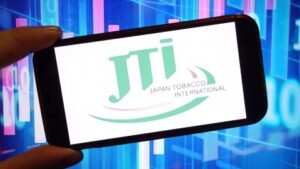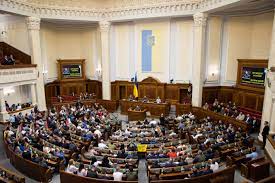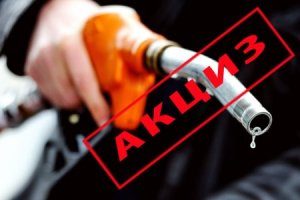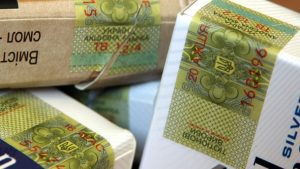
JTI Ukraine, one of the largest companies on the market, paid UAH 21.2 billion in taxes to the state budget in the first half of 2025, which is 75% more than in the same period of 2024.
“The main factors behind the growth were legislative changes, in particular the increase in excise tax rates, as well as improvements in the company’s operating performance and changes in the exchange rate,” the company said in a press release on Monday.
According to the press release, excise taxes traditionally accounted for the largest share of tax revenues, amounting to UAH 16.4 billion, which is 81% more than in the first half of 2024.
It is noted that VAT payments increased by 73% to UAH 2.76 billion as a result of stable demand, adaptation to regulatory changes, and balanced cash flow management.
“Significant growth was also recorded in other areas: income tax (+45%), customs duties (+37%), single social contribution (+24%), personal income tax and military tax (+36%),” according to a press release quoting JTI Ukraine CFO Olga Sulitska.
The company added that in the second half of the year it plans to strengthen risk management while maintaining stability in tax and social obligations.
JTI Ukraine is part of Japan Tobacco International (headquartered in Geneva), the international tobacco business of the Japan Tobacco group of companies (headquartered in Tokyo). It has been operating in Ukraine since 1999 and is currently represented by two companies with over 800 employees: JTI International Company Ukraine, with its central office in Kyiv, and four regional offices and a factory in Kremenchuk (Poltava region), JTI International Ukraine.
JTI Ukraine manufactures products for both the domestic market and for export to nine countries around the world. The declared investments over 26 years of operation amount to over $433.7 million, with additional investments of $60 million planned for 2024–2026 in the category of tobacco products for electric heating (TPE).
According to YouControl, JTI International Company Ukraine increased its revenue by 37.7% to UAH 18.60 billion in the first half of this year, and its net profit by 15.7% to UAH 1.11 billion.
Revenue of JT International Ukraine grew by 61.8% in January-June this year, to UAH 4.74 billion, while net profit doubled to UAH 1.23 billion, according to YouControl data.
As reported, another major player in the tobacco market, Philip Morris Ukraine, previously reported a 17% increase in tax payments for January-June 2025, to UAH 28.9 billion (excise tax – UAH 22.9 billion, VAT – UAH 5.4 billion).
According to the Ministry of Finance, excise tax revenues in the first half of 2025 increased by 45.7% to UAH 132.7 billion.

The working group under the Verkhovna Rada Committee on Finance, Tax and Customs Policy considered the bill on increasing excise duties on tobacco, which is preparing for consideration by Parliament in the second reading, said the head of the parliamentary committee Daniil Getmantsev.
“The bill is unambiguously timely and will be supported by the Verkhovna Rada. At the same time there are issues that should be considered in the second reading. Realized by the deputies in the hall. Among them the schedule for increasing excise tax rates, their size on certain items and increase in ad valorem rate,” – he wrote in Telegram on Monday.
In addition, according to Getmantsev, there are several other technical issues to the text of the bill to increase excise taxes on tobacco products. The deputies intend to find consensus on them at the level of the parliamentary committee.
Getmantsev also said that the bill adopted in 2020 on the introduction of excise tax on tobacco-containing products for electric heating (TIEN) helped the state to get to date 22.5 billion UAH.
“A good result”, – summarized the head of the Finance Committee.
As reported, the European Business Association strongly opposes the amendments to the Tax Code of Ukraine on revision of excise tax rates on tobacco products (draft law No. 11090), which is being considered in connection with the requirements of the EU Council Directive on the structure and rates of excise taxes applicable to tobacco products.
The revision of excise tax rates on tobacco products already from July 1, 2024 is not in line with the principle of stability of tax legislation, the EBA argued.
The experts drew attention to the fact that the excise tax rates on tobacco products are scheduled to increase by 20% annually for 2024-2027. However, the draft law No. 11090 proposes to increase these rates unevenly. For example, it is proposed to increase the excise tax rate on cigarettes in 2025 by almost 23.5%, and in 2026 and 2027 – by about 5% annually. According to business representatives, such an approach would have a shock effect on the market in 2025.
Meanwhile, member companies support a differentiated schedule of excise tax rate increases for cigarettes and tobacco products for electronic heating with an electronically controlled heater over 2024-2027.

President of Ukraine Volodymyr Zelensky said that the Verkhovna Rada should immediately abolish the value added tax and excise tax on fuel.
He noted that the Cabinet of Ministers has already taken several very important decisions. In particular, the complete abolition of value added tax and excise tax on fuel (gasoline and diesel) was agreed upon.
According to the head of state, this is being done not only in the context of the upcoming sowing campaign, but also based on the needs of all citizens.
“So that there is no shortage of fuel in the country and prices are stable. The government has done its part of the work. Now it is up to the MPs. They must immediately support this decision with their vote,” Zelensky said in a video message on Saturday.

The American Chamber of Commerce in Ukraine has called on Head of the Verkhovna Rada Committee on Finance, Tax and Customs Policy Danylo Hetmantsev to amend the Tax Code of Ukraine regarding the excise tax rate on heated tobacco products, according to the organization’s website.
“Since January 2021, law No. 466 has increased the tax rate on heated tobacco products by 320%. In the current economic realities, such a sharp increase in tax can lead to devastating consequences for the market and the economy of the country, since a significant increase in the price of such products will contribute to growth of illegal market, as a result of which the state will not receive the planned budget revenues,” the organization said.
According to the companies-members of the chamber, the plan to increase the excise tax rate on cigarettes needs to be amended by increasing it until 2030 with a 10% annual rate increase, as well as maintaining the current ad valorem component of the excise tax. At the same time, from January 1, 2021, the amount of excise tax is UAH 1,456 per 1,000 pieces with an annual tax rate increase of 20% to UAH 2,517 in 2024.
According to the American Chamber of Commerce, from January 1 of this year, the amendments introduced by law No. 466 also make it impossible to sell, transport and store liquids for electronic cigarettes already produced in 2020. Such restriction deprives tobacco companies of the opportunity to exercise their right to property, including storing, transporting, selling or exporting products outside the customs territory of Ukraine, the message said.
As reported, on January 16, 2020, the Verkhovna Rada adopted law No. 1210, which introduced amendments to the Tax Code, increasing the excise tax rate on heated tobacco products four-fold from January 1, 2021.

JTI Ukraine, one of the largest tobacco companies in Ukraine, has submitted an application to the State Fiscal Service of Ukraine (SFS) seeking to withdraw 16 million excise labels for which the company paid UAH 350 million in connection with the adoption of bill No. 1049 containing a requirement of regulating the cigarette markup, the company told Interfax-Ukraine on Tuesday.
“We are withdrawing UAH 350 million of excise tax paid due to the adoption of a bill establishing a fixed markup for cigarettes by the Verkhovna Rada,” the press service of the tobacco company said.
According to JTI Ukraine, the company reduced production by 73% in the second half of October compared to its plans.
As reported, British American Tobacco (BAT), a large global tobacco manufacturer, halted production at the B.A.T.-Pryluky factory in Chernihiv region on October 11, 2019. The company said that the reason was bill No. 1049 adopted by the Verkhovna Rada with the requirement on the government regulation of the markup on their goods. Then the company applied to the SFS with the purpose of withdrawing 25 million excise labels and returning UAH 505 million paid for them.
Earlier Philip Morris Ukraine, British American Tobacco, JTI and Imperial Tobacco in Ukraine are mulling the possibility of decreasing production and later closing the tobacco factories on the territory of Ukraine over the adoption of the legislative requirement on the government regulation of markup on their goods by the Verkhovna Rada.
Bill No. 1049, passed at second reading, introducing a single account for paying taxes and duties, the single social security contribution, sets a fixed markup for wholesale and retail traders of tobacco products at 7% and 13% of the maximum retail price per package.
Later, the Council of Entrepreneurs under the Cabinet of Ministers has asked Ukrainian President Volodymyr Zelensky to veto bill No. 1049 introducing a single account for paying taxes and duties, and the single social security contribution, as it deprives enterprises of the right to set prices for tobacco goods.

The European Business Association (EBA) has called to annul the excise label for wine, as it does not help to fight counterfeit products, while creates additional expenses for manufacturers, the press service of the association has reported.
According to the EBA, Ukrainian legislation requires the application of an excise label on all beverages with an ethyl alcohol content of more than 8.5% ABV. At the same time, wines with 1.2-15% ABV are subject to excise tax at a rate of UAH 0.01 per liter, while the value of the label is UAH 0.19 per piece. Alcohol importers also bear the cost of sending labels abroad.
“According to the calculations of the member companies of the association, there are UAH 278.6 of additional expenses per UAH 1 of the paid excise tax. Moreover, the major part of the sum does not go to the budget of Ukraine, but remains abroad,” the EBA said.
According to the EU regulations on labeling and protection of names of origin of alcoholic beverages, which Ukraine will have to adapt, beer from malt, grape wines, vermouth, cider and ethyl alcohol are not considered to be alcoholic beverages. Consequently, their quality control in Ukraine should not take place with the help of excise labels, but according to the general legislation on product safety, the EBA said.
“The products with alcohol content up to 8.5% ABV do not apply the excise labels. However, the safety control of such products is carried out. Therefore, it is reasonable to introduce the same logic for products with 1.2-15% ABV,” the EBA reports.
According to the press service, to abolish the excise labels, it is necessary to make changes to the Tax Code. “The business has already submitted the relevant proposals to the government. We hope that they will be taken into account in the near future,” the EBA said.